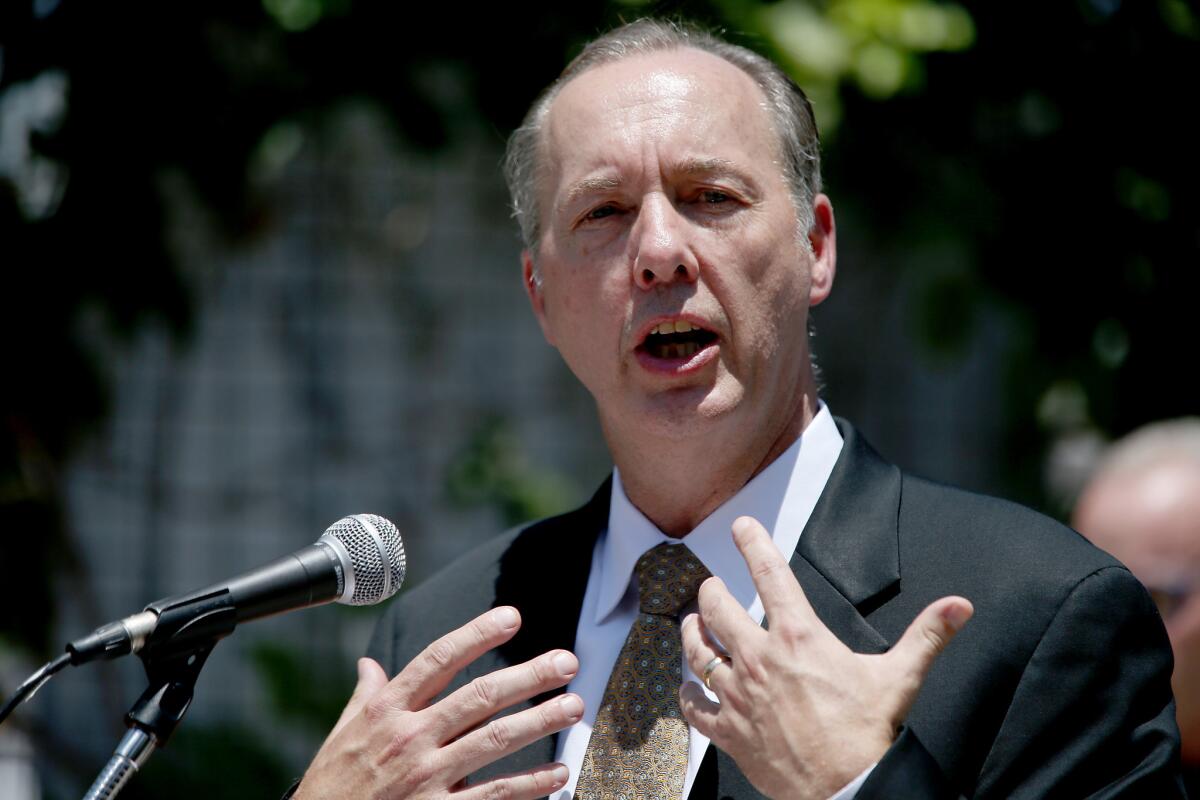Meningitis outbreaks among gay men have experts puzzled

- Share via
As cases of meningitis, a rare and potentially fatal disease, popped up in cities nationwide over the past several years, public health officials noticed a trend: many of those infected were gay men.
There’s no known medical reason why meningitis, which is transmitted through saliva, would spread more among gay and bisexual men. Yet New York, Chicago and now Southern California have experienced outbreaks disproportionately affecting that population.
“It is perplexing,” said Dr. Rachel Civen, a medical epidemiologist at L.A. County’s Department of Public Health.
Of the 13 cases of meningitis this year in L.A. County — excluding Long Beach, which has its own health department — seven were gay men. There were only 12 meningitis cases in the county in all of 2015, one of which was a gay or bisexual man.
In Long Beach, there have been six meningitis cases this year, half of which were gay men. Last year there were no meningitis cases in the city, according to city officials.
Civen, who has tracked the county’s meningitis cases for a decade, said it was “pretty striking” that half or more of the cases in both jurisdictions were gay men.
Meningitis cases in L.A. and Orange counties are thought to be connected because lab testing showed that many patients were infected with the same strain of meningococcus, known as serotype C.
Federal, state and local public health officials are working together to investigate the current outbreak, which is estimated to have begun in February, with most cases in the past two months. A man in Orange County died after being infected this year, alarming many in the region’s gay community.
“Certainly my patients have shown concern that something is running through the community like wildfire,” said Dr. Jay Gladstein, an internal medicine doctor in downtown L.A. who mostly treats gay and bisexual men. If patients survive the infection, it can still cause permanent brain damage or hearing loss.
The bacteria that causes meningitis is transmitted by swapping saliva, by means such as kissing and sharing drinks. It requires prolonged, close contact and is not as easily spread as the flu, experts say.
Gladstein, who is also an HIV specialist, said he thinks that the cases are likely among men who have multiple sexual partners, engage in anonymous sex and use drugs that make them more susceptible.
“It’s a particular sub-population of gay men,” Gladstein said.
Earlier this year, the U.S. Centers for Disease Control and Prevention and the New York City Department of Public Health launched a project to investigate the connection between gay men and meningitis. It’s possible that L.A. County will be included in the study as well, officials said.
“They’re looking at as many things that they can think of that might explain this — behaviors, sexual partners, nonsexual partners, close intimate contact in which saliva might be exchanged, immune status, HIV-positive, HIV-negative, other sexually transmitted infections,” said Dr. Robert Bolan, the medical director at the Los Angeles LGBT Center.
The research may also consider whether meningitis can be transmitted in other ways, such as sexual routes that might be making gay men more susceptible, Civen said. The bacteria Neisseria meningitidis that leads to meningitis is known to colonize the throat and mouth, but researchers will investigate whether it can also colonize other parts of the body, such as the genitals or anus.
Three years ago, there was a similar increase in meningitis cases among gay men in L.A. County, during which three people died of the disease. That followed a bigger outbreak in New York City that began in 2010.
But among L.A.’s cluster of 13 cases between late 2013 and mid-2014, 31% were HIV-positive and therefore could have had weakened immune systems, Civen said. Only one of this year’s meningitis patients was HIV-positive.
That’s part of the reason why health officials expanded their vaccination recommendations this week from gay men who are HIV-positive or engage in high-risk behaviors, such as having multiple sexual partners, to include all gay men. Civen said they found that if those infected this year who met the original vaccination recommendations had been inoculated against meningitis, only a third of the cases would have been prevented.
L.A. County and Long Beach health departments are giving out free vaccines to all gay men.
Meningitis is still a very rare disease, with fewer than 1 case per 100,000 people per year. Symptoms begin quickly and include nausea, vomiting and confusion. If not treated, the infection can kill within hours.
Michael Weinstein, president of the AIDS Healthcare Foundation, said he doesn’t think county officials have done enough to warn gay men to protect themselves. He said his organization will soon put up billboards encouraging vaccination.
“We’ve known now for several years that there’s a great disproportion of men who have sex with men who are coming down with meningitis … and nobody has an answer as to why yet,” he said. “Maybe there’s a very simple explanation or maybe there’s a more complicated one, but we don’t know.”
ALSO
Child brides sold for cows: The price of being a girl in South Sudan
‘One of our officers was murdered last night’: San Diego police shaken by fatal attack
Photographer sues Getty Images for $1 billion after she’s billed for her own photo
More to Read
Sign up for Essential California
The most important California stories and recommendations in your inbox every morning.
You may occasionally receive promotional content from the Los Angeles Times.










